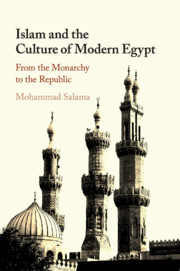Description
Islam and the Culture of Modern Egypt
From the Monarchy to the Republic
Author: Salama Mohammad
Examines the influence of Islam, as a religion, a practice, and a tradition, on Egypt's visual and literary modernity.
Language: English
Subject for Islam and the Culture of Modern Egypt:
Islam and the Culture of Modern Egypt
Publication date: 06-2020
Support: Print on demand
Publication date: 06-2020
Support: Print on demand
Approximative price 107.81 €
In Print (Delivery period: 14 days).
Add to cart
Islam and the Culture of Modern Egypt
Publication date: 11-2018
234 p. · 15.7x23.5 cm · Hardback
Publication date: 11-2018
234 p. · 15.7x23.5 cm · Hardback
Description
/li>Contents
/li>Biography
/li>
Telling a new story of modern Egypt, Mohammad Salama uses textual and cinematic sources to construct a clear and accessible narrative of the dynamics of Islam and culture in the first half of the twentieth century. The conflict between tradition and secular values in modern Egypt is shown in a stimulating and challenging new light as Salama bridges analysis of nationalism and its connection to Islamism, and outlines the effects of secular education versus traditional Islamic teaching on varied elements of Egyptian society. These include cultural production, politics, economic, identity, and gender relations. All of this helps to discern the harbingers that led to Egypt's social transition from the monarchy to the republic and opens the possibility of Islam as an inspiring and inspirational force. This illuminating, provocative and informative study will be of use to anyone interested in the period, whether general readers, students, or researchers.
Preface; A note on transliteration and translation; Introduction: prelude, considerations, and definitions; 1. History matters; 2. Nahḍa-t Miṣr: Zaynab and the cultural Renaissance of modern Egypt; 3. Blindness and insight: challenging the sacred/secular divide in Ṭāhā Ḥusayn's The Days; 4. An Egyptian Sophocles: Qurʾānic inspiration in Tawfīq al-Ḥakīm's People of the Cave; 5. Writing the mad text: freedom, modernity and God in Naguib Mahfouz's 'The Whisper of Madness'; 6. Islamism writes back: Alī Aḥmad Bākāthīr's Red Revolutionary and the dismantling of the secular; 7. Realism and utopian irony in Yūsuf Idrīs's Faraḥāt's Republic; 8. Islam and secular nationalism in a film age: unveiling Youssef Chahine's Gamīla al-Gazā'iriyya; Appendix 1: 'The Whisper of Madness'; Appendix 2: an interview with Youssef Chahine; Appendix 3: feature films produced in Egypt from 1927–62; Bibliography; Index.
Mohammad Salama is Professor and Director of the Arabic Program at San Francisco State University. He has published numerous articles on comparative literature and Arabic literature and film and is author of The Qur'an and Modern Arabic Literary Criticism (forthcoming), Islam, Orientalism, and Intellectual History (2011), and co-editor of German Colonialism: Race, the Holocaust, and Post-War Germany (2011). He is the recipient of two Fulbright Scholar Awards.
© 2024 LAVOISIER S.A.S.




